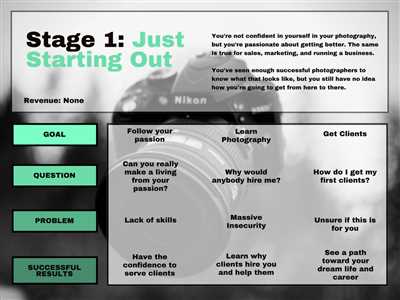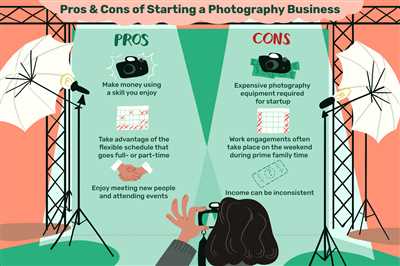
If you’re a photographer looking to start or grow your own photography business, there are many things you need to know. Whether you’re just starting out or already have some experience under your belt, it’s important to have a plan in place to help you navigate the world of photography and execute your ideas.
One of the first things you should do when setting up a photography business is to find your focus and speciality. What type of pictures do you want to take? What does your studio or website name imply about your work? Taking the time to think about these things will help you build a strong foundation for your career.
Once you have a basic idea of what you want to cover, it’s important to start networking. Even just getting started in photography, there are many photographers out there who can help you. Don’t be afraid to reach out and ask for advice or guidance. Many photographers are happy to help new people in the industry.
In addition to networking and building relationships with other photographers, it’s also important to focus on marketing. In today’s digital age, a strong online presence is essential. Open social media accounts and create a website to showcase your work. This will help potential clients find you and improve your chances of getting hired.
Another thing to consider is the mistakes that many photographers make when starting their own business. By knowing what not to do, you can avoid common pitfalls and make the most of your time and resources. One mistake that photographers often make is not taking care of their finances. It’s important to keep track of your expenses and revenue to ensure that you’re running a sustainable business.
Finally, be prepared to put in the work. Building and developing a photography business takes time and effort. It may take a while before you start seeing the results of your hard work, but with dedication and persistence, you can achieve your goals. So don’t give up when things get tough!
In conclusion, if you want to develop your photography business, start by creating a clear plan. Know your focus and speciality, network with other photographers, and take advantage of free marketing sources like social media and websites. Learn from the mistakes of others and be prepared to put in the time and effort required. With the right guidance and determination, you’ll be on your way to building a successful photography business by 2022!
Start a Photography Business The 2022 ‘How To’ Guide for Startup Photographers
So, you want to start a photography business in 2022? That’s great! Photography is not only a creative outlet but can also be a rewarding career if you know how to develop and market your skills properly. Whether you’re already a talented photographer or just starting out, this guide will help you navigate the exciting world of photography and set up your own successful business.
First things first, you need to define what type of photography you want to focus on. Do you want to specialize in portrait photography, wildlife photography, or maybe even wedding photography? The possibilities are endless, but it’s important to choose a niche where you can showcase your unique skills and stand out from the competition.
Once you’ve decided on your specialty, it’s time to give your business a name. You want something catchy and memorable that reflects your style and personality as a photographer. Take some time to brainstorm and write down a list of potential names. Don’t be afraid to get creative!
Now that you have a name, it’s time to start building your photography portfolio. This is crucial because potential clients will want to see examples of your work before hiring you. Start by taking some high-quality pictures of your friends and family to showcase your skills. You can also offer your services for free or at a discounted rate to build up your portfolio.
In addition to a portfolio, you’ll also need a website to showcase your work and attract clients. There are many free website builders available that make it easy to create a professional-looking website without any coding knowledge. Make sure to include a gallery of your best work, an about page to introduce yourself, and a contact page so potential clients can get in touch with you.
Marketing is another crucial aspect of starting a photography business. You can have the best pictures in the world, but if nobody knows about them, you won’t get any clients. Create social media accounts on platforms like Instagram and Facebook to showcase your work and connect with potential clients. Post regularly and engage with your followers to build a strong online presence.
Networking is also an important part of growing your photography business. Attend industry events, join photography groups, and connect with other photographers in your area. Building relationships with other professionals can lead to referrals and collaborations, helping you expand your client base.
As with any business, mistakes are bound to happen. Learn from them and use them as opportunities for growth. Stay up-to-date with the latest photography techniques and trends, and continuously strive to improve your skills. Taking workshops, reading books, and following photography blogs are great ways to expand your knowledge and stay ahead of the competition.
Finally, have a business plan in place. This will help you stay organized and focused on your goals. Outline your financial projections, marketing strategies, and growth plans. Set realistic targets for yourself and track your progress regularly. It’s important to treat your photography business not just as a hobby, but as a serious and professional venture.
So, whether you’re a photography enthusiast looking to turn your passion into a business or an aspiring photographer just starting out, this guide will provide you with the necessary knowledge and resources to get started in the exciting world of photography. Remember, with hard work, dedication, and a strong business plan, you can turn your photography dreams into a successful reality.
Find your speciality

As a photographer, it’s important to find your speciality in order to stand out from the competition and attract clients. While it may be tempting to cover every aspect of photography, focusing on a specific niche can actually help you build a successful photography business.
When you specialize in a particular area, you can become an expert in that field and establish yourself as the go-to photographer for that specific type of work. This can lead to more referrals, repeat clients, and higher rates.
So, how do you find your speciality? First, you need to know what you’re passionate about. What type of photography gets you excited and motivated? Is it portrait photography, wedding photography, landscape photography, or something else entirely?
Next, research and network with other photographers in your chosen field. Look at their work, learn from their techniques, and connect with them through social media or photography communities. This will give you a better understanding of the industry and help you improve your own skills.
Once you have an idea of what you want to specialize in, it’s important to start taking pictures and building your portfolio. Whether you have your own studio or you prefer to shoot on location, make sure you have a variety of high-quality images showcasing your unique style and abilities.
While it’s tempting to just post your pictures on social media and wait for the clients to come to you, a more proactive approach is needed. You need to market yourself and get your name out there. Create a website to showcase your work, list your services, and provide contact information.
Additionally, use social media to your advantage. Share your best work on platforms like Instagram and Facebook, and engage with your audience by responding to comments and messages. This will help you grow your online presence and attract potential clients.
Another important aspect of finding your speciality is to have a plan. Set goals for your photography business and determine how you will achieve them. Identify your target audience, research your competition, and develop a pricing and marketing strategy. Having a solid plan in place will help you stay focused and make smarter business decisions.
Finally, don’t be afraid to make mistakes and learn from them. Starting a photography business is a journey, and it’s normal to encounter obstacles along the way. Remember that even the most successful photographers started from scratch and faced challenges. Learn from their experiences and adapt your approach as needed.
In summary, finding your speciality is crucial for the success of your photography career. By focusing on a specific niche, you can differentiate yourself from other photographers, attract the right clients, and build a thriving business. Take the time to explore different areas of photography, network with industry professionals, and develop a strong marketing plan. With dedication and persistence, you’ll be well on your way to establishing yourself as a unique and sought-after photographer in 2022 and beyond.
Develop a business plan

When starting your own photography business, it is essential to have a well-thought-out business plan. This plan will serve as a roadmap for your journey, helping you define your goals, strategies, and the steps you need to take in order to achieve success.
Here are some key elements to consider when developing your photography business plan:
- Define Your Business: Start by clearly defining your business. What is the name of your photography business? What is your specialty or niche? Identify what sets you apart from other photographers and define your unique selling proposition.
- Set Clear Goals: Determine what you want to achieve with your photography business. Do you want to build a successful career as a photographer, create a popular website, or open your own studio? Set specific, measurable, achievable, relevant, and time-bound (SMART) goals to guide your actions.
- Know Your Target Audience: Identify your target market and understand their needs and preferences. Who are your ideal clients? Where can you find them? Knowing your target audience will help you tailor your marketing and communication strategies to effectively reach and engage them.
- Develop a Marketing Plan: Create a comprehensive marketing plan to promote your photography business. Utilize various marketing channels, such as social media, online advertising, content marketing, and networking. Determine the best strategies for reaching your target audience and allocate your budget accordingly.
- Financial Planning: Outline the financial aspects of your photography business, including startup costs, ongoing expenses, pricing of your services, and revenue projections. Keep track of your financial performance and make adjustments when needed. Seek professional help if necessary.
- Build a Network: Networking can play a significant role in growing your photography business. Attend industry events, join photography associations, and connect with other photographers and professionals in the field. Building a strong network can lead to new opportunities, collaborations, and clients.
- Create a Website: In today’s digital age, having a professional website is essential for any photography business. Showcase your portfolio, list your services, and provide contact information for potential clients. Ensure that your website reflects your unique style and brand.
- Continuous Learning and Improvement: The photography industry is constantly evolving, so it’s important to stay updated with the latest trends, techniques, and technologies. Invest in workshops, courses, and seminars to improve your skills and expand your knowledge. Learn from your mistakes and continuously strive for improvement.
Remember, developing a business plan is not a one-time task. It is an ongoing process that requires regular evaluation and adjustments. By having a well-defined plan in place, you’ll be better equipped to navigate the challenges and opportunities that come with running a photography business.
So, take the time to carefully develop your business plan and execute it with dedication. With the right strategies and a strong plan, there is no limit to what you can achieve in the photography industry.
Develop and Execute a Marketing Plan
When you open a photography business, it’s important to cover all aspects of marketing to ensure its success. Developing and executing a marketing plan is a key step in building a strong and thriving photography business.
First, you need to define your target market and write down a detailed plan on how you’ll reach them. Consider the unique selling points of your business and what sets you apart from other photographers. This will help you build a strong brand identity that resonates with your target audience.
One of the first things you should do is create a website to showcase your portfolio and services. Your website should reflect your speciality and be a hub for potential clients to find and learn more about you. Make sure your website is user-friendly and visually appealing, as first impressions are crucial in the photography industry.
Another essential part of your marketing plan is utilizing social media. Take advantage of platforms such as Instagram, Facebook, and Pinterest to share your work, engage with your audience, and attract new clients. You can post your pictures, write captions, share behind-the-scenes stories, and even host live sessions or Q&A sessions to connect with your followers.
Networking is also a basic but crucial aspect of marketing for photographers. Attend industry events, join photography groups, and collaborate with other professionals in the field. Networking can lead to valuable partnerships, referrals, and even mentorship opportunities.
Additionally, consider taking free online courses or attending workshops to learn more about marketing strategies specifically for photographers. There are many online resources and educational platforms available where you can enhance your marketing skills and stay up to date with the latest industry trends.
When setting up your marketing plan, don’t forget to include a budget for paid advertising. While organic growth is important, paid ads can help accelerate your business’s growth and reach a wider audience. Consider investing in targeted ads on social media platforms or even Google AdWords to increase your visibility.
Lastly, track your marketing efforts and analyze the results. This will help you identify what is working and what can be improved. Use analytics tools to measure website traffic, social media engagement, and conversion rates. By continuously evaluating and adjusting your marketing plan, you’ll be able to optimize your strategies and ensure the success of your photography business.
In conclusion, developing and executing a marketing plan is essential for photographers to grow their business and achieve success. By focusing on your target market, utilizing various marketing channels, and continuously refining your strategies, you’ll be able to establish a strong online presence, attract clients, and establish your photography career in 2022 and beyond.
Improve your photography business
Whether you’re just starting your photography career or already have a photography business, it’s important to constantly work on improving and growing. In 2022, with so many photographers out there, you need to find your own unique way to stand out and attract clients. Here are some tips to help you develop and improve your photography business:
- Focus on your speciality: Instead of trying to cover every aspect of photography, focus on a specific niche or style that you excel in. This will help you build a strong and recognizable brand.
- Execute a solid business plan: Take the time to write a detailed business plan that covers all the aspects of your photography business, from marketing and pricing to equipment and finances. This will give you a clear roadmap to follow.
- Network with other photographers: Building a network of fellow photographers can help you find new opportunities, learn from each other, and collaborate on projects. Attend photography events, join online photography communities, and reach out to photographers whose work you admire.
- Improve your skills: Never stop learning and honing your craft. Take photography courses, workshops, or even just spend time practicing and experimenting with new techniques. The more skilled you become, the better your pictures will be.
- Have a professional website: In today’s digital age, having a strong online presence is essential. Create a website to showcase your work, share your contact information, and provide information about your services. Make sure your website is visually appealing, easy to navigate, and mobile-friendly.
- Find sources of inspiration: Stay inspired by following other photographers, exploring different styles of photography, and seeking out new ideas. This will help you keep your work fresh and prevent creative burnout.
- Market your business: Develop a solid marketing strategy to promote your photography business. Utilize social media platforms, create engaging content, and use targeted advertising to reach your ideal clients. Don’t forget to leverage the power of word-of-mouth marketing as well.
- Avoid common mistakes: Learn from the mistakes of other photographers and avoid common pitfalls. Research the industry, seek advice from experienced photographers, and continuously evaluate and improve your business practices.
- Provide exceptional customer care: Going above and beyond for your clients will set you apart from the competition. Provide excellent customer service, be responsive to inquiries, deliver high-quality work, and exceed your clients’ expectations.
- Stay updated with industry trends: The photography industry is constantly evolving. Stay updated with the latest trends, technology, and techniques to ensure you are offering the best services to your clients.
By following these tips and continuously working on improving your photography business, you’ll be able to grow your client base, increase your revenue, and achieve long-term success in the photography industry.









